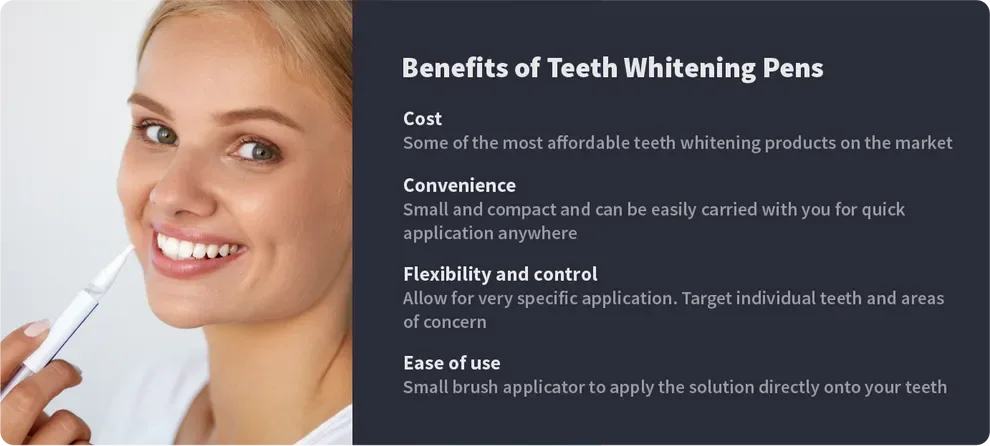Do Teeth Whitening Pens Actually Work?

Table of Contents
- Teeth Whitening Options
- Whitening Pen Process
- Safety Regulations
- Pros of Whitening Pens
- Potential Risks
- Teeth Whitening Pens How-To
- Brighter Smile Tips
- References
Teeth whitening pens can lighten the color of your teeth, depending on the cause and significance of the staining. They are not suitable for everyone, as they can have some adverse effects.
Teeth whitening pens do work, but they are not going to make drastic changes in tooth color. They are usually best for maintaining tooth color in between professional teeth whitening procedures.
Options to Whiten Your Teeth
Nearly 40 million Americans used a tooth whitening product in 2019. Whiter and brighter smiles are highly desirable and therefore big business.
When it comes to tooth whitening products, there are many options, ranging from professional in-office dental whitening procedures to over-the-counter toothpastes, trays, gels, and strips.
How Whitening Pens Work
Teeth whitening is accomplished by bleaching the teeth, usually with a carbamide peroxide or hydrogen peroxide solution.
Teeth whitening pens typically contain somewhere between 6 and 9 percent hydrogen peroxide. Those containing carbamide peroxide use a 3:1 ratio. While they may seem to have a higher percentage of the bleaching agent, they actually have less.
With a tooth whitening pen, you will brush the solution directly onto your teeth, one tooth at a time. This is different than other methods like trays or strips that make contact with all your teeth at once. As the bleaching solution is painted onto your teeth, it forms a film that works to lighten your teeth by breaking up stains.
Safety & Regulation
Teeth whitening pens are over-the-counter products that can be purchased at many retailers.
Teeth whitening products are not regulated by the FDA, as they are considered to be cosmetic products. Many do contain an ADA Seal of Approval, which means that they are considered both safe and effective when used as directed.
Each manufacturer of teeth whitening pens will have specific guidelines to follow to ensure the customer’s safety and satisfaction. Be sure to stick to these directions.
Pros of These Pens

When used exactly as directed, over-the-counter teeth whitening products (such as teeth whitening pens that contain hydrogen peroxide or carbamide peroxide solutions) are reported to be effective and safe.
Some of the advantages of teeth whitening pens include:
Cost. Teeth whitening pens are some of the most affordable teeth whitening products on the market.
Convenience. These pens are small and compact. They can be easily carried with you for quick application anywhere you go.
Flexibility and control. The pens allow for very specific application. You can target individual teeth and areas of concern.
Ease of use. You’ll use a small brush applicator to apply the solution directly onto your teeth.
Teeth whitening pens are generally considered safe when used as directed, they can help to lighten your teeth, especially when combined with professional treatments.
Potential Risk Factors & Side Effects
Teeth whitening pens are not effective on tooth restorations. They are not going to break down major stains or create a drastic difference in the color of your teeth. They also can take much longer to work than a professional teeth whitening procedure.
Some of the biggest potential side effects to teeth whitening products are tooth sensitivity and gingival irritation. Use of a tooth whitening pen, or any whitening product, can make your teeth especially sensitive to hot and cold temperatures, certain tastes, and textures. The sensitivity is usually short-lived though.
It can be cumbersome to reach all of your teeth easily with these pens. In particular, it can be tough to reach the back teeth well with the pen.
You do not get the same prolonged or constant contact with a bleaching agent with pens like you do with a tray or strips. This is difficult since saliva can break down the bleaching agent so fast that it doesn’t have a chance to be effective. The effect of teeth whitening pens is therefore often minimal.
How to Use Teeth Whitening Pens Effectively
While teeth whitening pens may not be as concentrated as other whitening products, they can still help to lighten your teeth somewhat. They are mostly useful for touchups after a professional tooth whitening procedure.
The best way to get the most out of a tooth whitening pen is to carry it with you and use it as soon as you eat or drink something that is highly staining, such as coffee or wine. The whitening agent in the pen can start breaking down the stain right away. This can help to keep stains from setting into your teeth as easily.
Follow all instructions from the manufacturer on your teeth whitening pen. Choose one that has a higher concentration of hydrogen peroxide solution.
Talk to your dentist about any over-the-counter whitening products you use. They can advise how to maximize their effectiveness and stay safe when using these products.
Tips for a Brighter Smile
Want a brighter and whiter smile? Practice good oral hygiene, and see your dentist for regular cleanings.
Here are basic guidelines to help you achieve and maintain white teeth:
Brush and floss your teeth twice daily.
Keep up with regular dental visits and cleanings.
Don’t smoke or use tobacco products.
Limit staining foods and beverages, like wine and coffee.
Drink plenty of water.
Try to stick to mealtimes and snack less often throughout the day.
Teeth whitening pens are relatively inexpensive. They can be a solid tool to help you maintain a white smile, although they are not going to work on all stains or provide instant and significant results.
